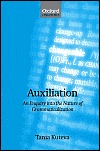
Book Details
Even those with little training in linguistics have remarked that the languages of Europe show some striking similarities, such as the use of "have" plus a participle to form the perfect tense. In THE CHANGING LANGUAGES OF EUROPE Bernd Heine and Tania Kuteva convincingly argue that these similarities are due not to coincidence or parallel development (= "drift"), but to a series of language contacts radiating outwards from various centres in Western Europe over the last two thousand years. Two substantial introductory chapters open the book. In "Europe as a Linguistic Area" the authors describe previous research positing a European sprachbund, with certain languages lumped together in one theory and a different set in another. The second chapter is an introduction to the process of grammaticalization, showing how language contact-based innovations begin as small tendencies in an individual's speech (use patterns) that may eventually become integral features of the whole language. There are four changes that have appeared in many European languages and, the authors argue, are due to language contact: the rise of articles, the rise of possessive perfects, the merging of comitative and instrumental forms, and the use of question words as relative pronouns in subordinate clauses. Using textual evidence, the authors show how these new features gradually spreading throughout European. Documentary evidence makes it very clear that the disappearance of the synthetic preterite and its replacement in this function by the analytic perfect began in Parisian French in the 12th century, had spread into Germany a century later, and then hit northern Italian dialects by the end of the sixteenth century. (The benefits manuscript evidence provide to students of language contact make me bemoan the short history of writing in the Uralic languages I study.) Through their research, Heine and Kuteva have been able to postulate stages of grammaticalization, revealing that in some European languages things haven't progressed as much as others. Indeed, some languages haven't even started on the path at all. This helps better deliminate a possible European sprachbund, where suprisingly the Celtic languages and Russian are squarely outside the fold. Heine and Kuteva are two of the leading scholars in grammaticalization theory, and each has amassed a hefty publishing record. Nonetheless, they have succeeded here in explaining the specifics of grammaticalization in European languages without using too heady specialist terminology. Even an undergraduate in linguistics could profit from this book. And for those linguists who deal all day with difficult specialist material, this is a downright *fun* monograph.
- Binding Paperback
- Author/s Heine, Bernd / Kuteva, Tania
- ISBN13 9780199297344
- ISBN10 0199297347
- Pages 356
- Published 2006
- Language English
The Changing Languages of Europe
- Author Bernd Heine , Tania Kuteva
- Publisher OXFORD U.P.
- ISBN 9780199297344

Our booksellers can check its availability and give you an estimate of when it will be ready.
 Thank you for shopping at real bookstores!
Thank you for shopping at real bookstores!

 Alibri Llibrería, Barcelona
Alibri Llibrería, Barcelona
 Librería Lé, Madrid
Librería Lé, Madrid
 Caselles Llibrería, Lleida
Caselles Llibrería, Lleida














